The faux progressivism of “Scoob!”
The latest Scooby Doo movie, “Scoob!”, is an artificial neo-liberal take on the “pup named Scooby Doo” series.
“Scoob!” was meant to be the first entry into the Hanna-Barbera Cinematic Universe, whatever that is supposed to mean. In the early scenes, Shaggy (Will Forte) is a lonely kid, desperate for friendship. He finds it in a stray dog that he names Scooby (Frank Welker). On one Halloween, they run into Fred Jones (Zac Efron), Daphne Blake (Amanda Seyfried) and Velma Dinkley (Gina Rodriguez) and form the famous Mystery Incorporated detective crew. They age in a cliché montage and eventually Scooby and Shaggy run into some problems at a bowling alley, where the superhero crew led by Blue Falcon (Mark Wahlberg) saves them.
When they age, the animation takes a notable turn for the worse. The lines on the outside of the characters become more defined, and combined with the more realistic-looking adults, it creates an uneasy feeling — it’s not the “uncanny valley” but it has the same effect.
The animation gives off a faux feeling: it’s like something authentic but not quite. The politics of “Scoob!” function the same.
Director Tony Cervone and his crew aren’t subtle about their surface-level progressivism. When the characters go trick-or-treating, they dress as their favorite superheroes. Velma’s hero of choice? Ruth Bader Ginsburg, the progressive supreme court justice. Later, Fred gets in a scuffle with Blue Falcon and another character comments on the “toxic masculinity.” These politics feel contrived by not influencing the movie or its characters in any meaningful way. Perhaps the liberalism is meant to placate Hollywood’s more liberal audience.
One aspect of its politics feels authentic, though. As my hispanic wife noted, “Is Velma hispanic?” It’s hard to tell at first. She speaks Spanish once and is voiced by Gina Rodriguez, who is of Puerto Rican descent. She mostly takes a backseat to Scooby and Shaggy, but it’s a nice change of pace from the traditionally all-white cast.
Despite the filmmakers’ intentional progressivism, “Scoob!” is geared towards the masculine, a symptom of contrived rather than authentic politics.
Between directing, screenwriting and “story by” credits, seven men controlled the film — and it’s not terribly hard to tell. The movie fails the Bechdel test, which requires two women to talk to each other about something other than a male. A weird and difficult achievement since two of the main characters are women.
The film’s immature masculinity also comes through in its jokes: a character named “Dick” shouts that “I am Dick!” repeatedly, Fred cares about his car as much as his friends, and most notably, there is a scene where Fred gets googly eyed for a female cop who turns out to be Dick Dastardly (Jason Isaacs), the antagonist, and the reveal is used for a punchline. This effectively codes the villain, Dick Dastardly, as gender bending. Queer coding villains, an age-old problem, disposes viewers to think of queer people and queerness as abnormal, especially in children’s movies — the crossdressing and the subsequent same-sex attraction joke in “Scoob!” do just this.
“Scoob!”, whose theatrical release was canceled by the pandemic, is available for video on demand on most streaming services.




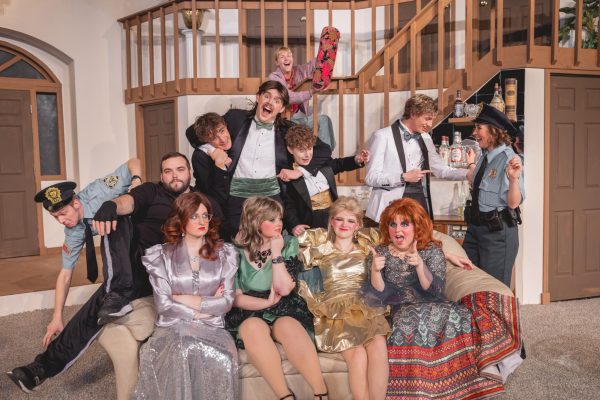
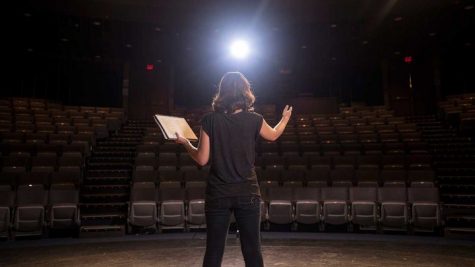
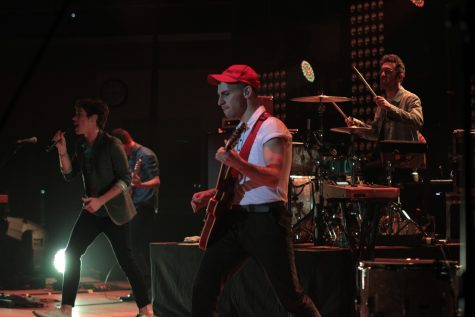
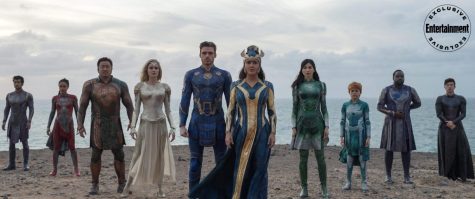

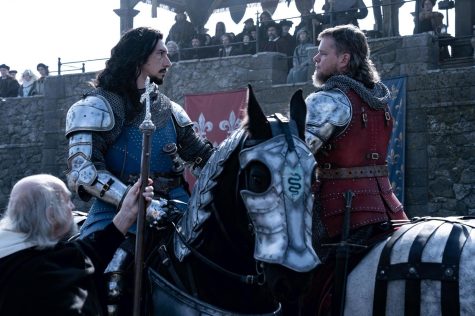

Muhammad • Nov 1, 2021 at 8:32 pm
Maybe you should touch grass instead of writing a political analysis on a children’s movie lol.
Bob • May 1, 2021 at 7:12 pm
Im just so offended that Tracy Morgan culturally appropriated a white caveman…
Joshua Polanski • Oct 22, 2020 at 9:22 pm
As the writer of this piece, I just want to note two quick things about many of the comments I’m seeing: 1) it’s a review of a Scooby-Doo movie and 2) read my criticism closely. I am not taking political sides, left or right, on this movie. I am saying the politics of the movie are inauthentic and are simply present to sell tickets to neo-liberals. Also, it’s a review of a Scooby-Doo movie.
dylan davis • Oct 22, 2020 at 11:06 am
“She mostly takes a backseat to Scooby and Shaggy, but it’s a nice change of pace from the traditionally all-white cast. ” Glad it’s fine that White culture can be appropriated and played by another race but Hank Azaria is forced out of the Simpsons. Hypocrites.
Hashi • Oct 11, 2020 at 6:58 pm
You call the Waaambulance over arguably the only funny joke on the entire film which enforces a very unexpected play on the phrase “Fred loves Traps”. I don’t care how progressive you are, that’s a good joke that is subtle enough that I would never have to explain it to my kids. Whichever one of the cynical checked-out dads who worked on this feature slipped that in has my respect. Or maybe that was a complete accident, but it still made me laugh out loud.
Juan • Jul 19, 2020 at 3:56 pm
At the very beginning of the movie you see two women with two shirts on with two heart halves, slamming their bodies together to make a whole heart, aligned with the lyrics of the song, its very in the face.
Just like Finding Dory, this movie is full of “men are stupid bumbling fools who only have a huge ego, are all brawn over brains, and are incredibly uneducated”. Even Fred said “I’m an American” as a response to not knowing the metric system. This is the view of the liberal who sees people who don’t want to conform to their agenda, touting both what appears to be patriotism but also stupidity/ignorance.
The halloween costomes make absolutely no sense. Someone geeky or nerdy would never look at Ruth as a ‘role model’ or hero, nor does Velma ever want to be a Supreme Court Judge of all things, those don’t mix, even Shaggy called her a Slytherin. Its obvious to see even their child selves were spoon-fed by parents or society. If Daphne was truly an ’empath’, seeing a girl who’s all about ‘lets use our feelings’ to win people (or robot) hearts, its the furthest thing from Wonder Woman’s image of a physically strong and honorable warrior who’s all about honor and battle, something Feminists would hate from male honor warrior code. But whatever looks good for men looks bad for women. Unless women do it. Daphne is also a perfect example of a neo-feminist labeling men with certain traits such as ‘alcoholism’ or mustache oil, having shady traits, to be a trait her own father has. While its supposed to be funny, it seems far from reality and unrelatable.
The movies makes a ton of references to other movies “And the slipper fits”, Stargate, Middle Earth (LOTR), the Rasm-Frasm.
It’s subtle but the movie is just another Disney movie with the message of ‘its okay for boys/men to be emotional or sensitive’. That’s not the real issue. The real issue is the constant push of how “men need to think/act more like women’. If you need to make an overly strong female character look good while make all the men appear to be bumbling idiots who only love fighting, you have a poor story, and a Mary Sue. There’s no Mary Sue in Scoob!, but it has a lot of glorification of females while portraying the worse of men. While men may have deserved this since women are portrayed as damsels who need saving so very often, but that’s merely a reflection of the mental and emotional state of women in the past, and its a trait that many have today. Cowering in fear while being in harm’s way, or the equivalent of the ostrich burying their head in the sand, as the saying goes.
The stakes seemed high but the ending was dirt cheap for the sake of the message.
This movie is a hard pass, one because the movie itself, and the other half being the progressivism that wasn’t necessary.
Dee c • Jul 15, 2020 at 10:40 pm
Hmmm, why no mention of the more appropriate leader playing sidekick, who happens to be an African-American woman, Dee Dee Sykes. Blue Falcon AKA Brian is the personification of patriarchal nepotism in the leadership role while a woman of color does all the thinking and hard work.
Jake • Jul 13, 2020 at 9:39 pm
I really hate it when movies have all this wokeness in your face, we get it, you don’t want some blue haired 200kg woman shaming your film on twitter, but really? It just takes away from the experience to please a minority of people, while annoying the majority.
These people need to grow up as they are damaging the film industry.
bill c. • May 17, 2020 at 8:39 pm
Also don’t forget, the movie pushes the metric system as superior to the American system of measurement, and that American men are dumb because they don’t know this, but instead know more about comic book heroes.